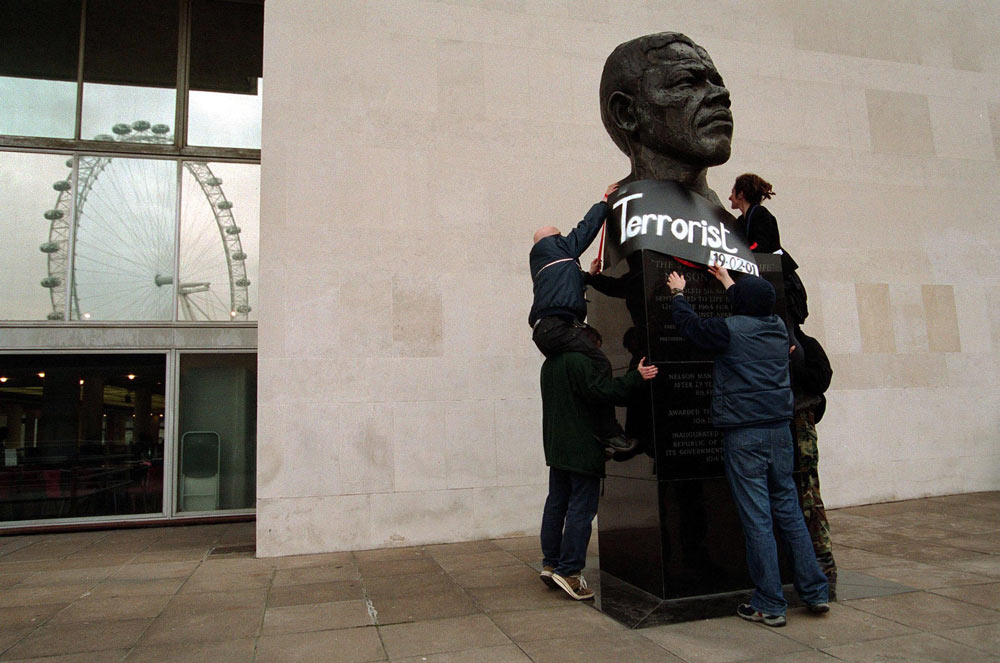
'Terrorists' Attack T.A.
Terrorism Act comes into force with activists marking its arrival
15th March 2001
Reclaim the Streets activists joined other campaigners in February to highlight the draconian measures contained in the new Terrorism Act.
The Act, which came into force on February 19, significantly increases the scope of the definition of terrorism to include political campaigners. Home Secretary Jack Straw was amongst a host of MP's who voted against the original Prevention of Terrorism Act in 1974, because it was argued the Act went beyond measures necessary to deal with genuine terrorism.
However, dismissing concerns over civil liberties, he has now brought in the most draconian terrorism legislation ever passed in the UK.
"The new law means those who carry out purely criminal acts, for greed or viciousness, will have more rights than those accused of offences inspired by idealism who will have to spend longer in custody and will have to prove their innocence rather than the prosecution prove their guilt," says Roger Bingham from the civil rights organisation, Liberty.
Defending the imposition of the new law, Jack Straw claimed: "In this country we have a very clear tradition by which people are fully entitled to engage in all kinds of peaceful, sometimes very noisy protest. But they are not entitled to engage in seeking to disrupt the way our democracy operates. What the Terrorism Act does is give the police better powers of investigation than they will have otherwise for ordinary criminals," The new law extends the definition of terrorism to include anyone motivated by a "political, religious or ideological" cause who "uses violence or the threat of violence"... "against persons or property".
Among the Act's inclusions within the definition of terrorism, are if the use or threat of the action is designed to influence the government or to intimidate the public or a section of the public; creates a serious risk to the health or safety of the public or a section of the public; or is designed seriously to interfere with or seriously to disrupt an electronic system.
This inclusion of the 'threat of violence against property' and other unspecific 'terrorism' criteria mentioned above, embrace a wide range of extra-parliamentary political activity including campaigns against GM food and trident nuclear missiles.
In keeping with the recent parliamentary complicity in passing law without regard to civil liberty, the new measures passed without party political opposition. To draw some attention to the ramifications of the new law, activists draped banners on the statue of Emily Pankhurst in Parliament Square highlighting the fact that under the new law, her campaigns with the women suffragettes for the right to a female vote would have been classed as terrorism.
The new Act also makes it a terrorist offence to support, through campaigning, holding meetings or political speaking, any foreign organisation deemed to be involved in terrorist activity abroad. Following the introduction of the Act, the Home Office proscribed 18 new foreign organisations as being terrorist.
As Liberty's Roger Bingham points out: "We have also got a very disturbing situation that people who oppose oppressive regimes abroad can now be deemed to be supporting terrorism. This would have meant that it would have been a terrorist offence to support Nelson Mandela if the law had been in force at the time. Most members of this government would have fallen foul of that."
An Activists Guide to the Terrorism Act is available along with other useful info on the Network Against the Terrorism Act website.
Related Articles
Raising Terror - The Terrorism Bill currently hurrying through parliament could be one of the most liberty-corrosive pieces of legislation for decades - March-2000
Download This & You Could Be A Terrorist - The new Terrorist Bill is currently rushing through parliament - with scant opposition - 16-Mar-2000
Dress Up For Your Rights - Protest march in Newcastle against the Terrorist Bill - 23-Mar-2000
Park Peppered With Sergeants As 'Terror' Hits Islington - Sgt Pepper's album cover re-enacted by activists to protest against upcoming Terrorism Bill - 01-May-2000
Terrible Terror Bill Law Next Year - The draconian new Terrorism Act about to come into force - 18-Nov-2000
Links
http://go.to/ta2000 *
http://www.blagged.freeserve.co.uk/terrorbill/index.htm *
* Wayback Machine link
